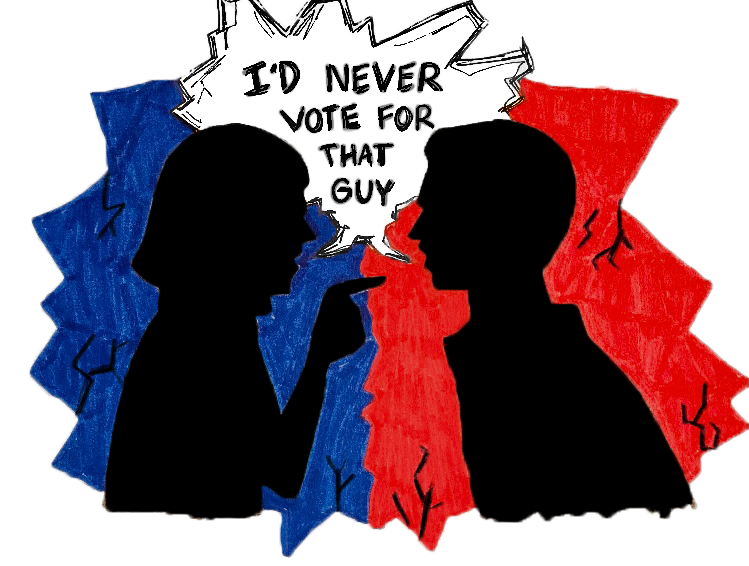What Divides Us
How we can come together and have meaningful conversations.
It was our founding fathers who warned us of our current two-party system. One in which a perceived party’s identity is equally valued with candidates’ specific policies. One in which candidates are being sold to us in an election year costing 11 billion dollars. One in which a question is echoing from land to sea, left to right: How could anyone vote for the other side? Exploring the ideas of single-issue voting, regional cultural disconnect, and the role of news sources, this piece will attempt to answer a larger question: why are we so divided?
Single-issue voting – voting for a candidate based solely on one issue – is meant to pass legislation surrounding that certain issue. Single-issue voters do this through spending their vote on whoever says they will prioritize that specific legislation, but there are other ways of leveraging politicians to support a certain belief. To examine this, let’s establish some ideas.
The goal of any politician should be to improve the lives of their constituents. However, during election season, their priority often shifts to being re-elected, meaning their support of issues can change in response to public pressure. Organizations that work to represent certain groups or issues, such as unions or clubs, can work in communities to convince others of their stances. This work can happen before something is considered a political issue, thus avoiding associating the topic with a specific party, while still providing leverage of public opinion.
Politicization is adverse to the overall goal of passing legislation because it makes something an issue based on ideology, rather than facts. The dangers are demonstrated in the Republican politicization of climate change, an issue grounded in science and facts.
The reason to reject single-issue voting and look to these alternatives? Single-issue voting simplifies all of one’s opinions into a sole policy. Each voter is personally affected by a multitude of issues, all of which should be factored into their vote if they wish to pick the best candidate for them. This process includes recognizing some issues as more important than others, but reducing voting entirely to one issue allows the election of morally ostentatious politicians and causes illogical election choices.
Another factor is regional disconnect (the difference in culture and ideologies that are fostered around the country), which often results in indecipherable political backings. Policy is not the only informant of voting – culture is another factor. Uninformed voters are the most likely to bandwagon the environment of ideas around them, but every voter is influenced by where they live due to the cultural norms within a home, as well as within a state or city, that translate into political bias. This persists throughout one’s life, as people are unlikely to change parties. Places where a certain political bias is of the highest probability show up as consistent red or blue states and lead to a positive feedback loop.
This cultural divide is also demonstrated between cities voting Democrat and rural areas voting Republican. Since the 1990s, Republicans have prioritized messaging to suburban and rural voters largely ceding cities to the Democrats. In rural areas, the connection between culture and politics is clear. This is exemplified in Washington State, where rural counties routinely strike down tax measures while benefiting unequally from them. This intra-state geographic distribution of voters played out in 2016, leading to Hillary Clinton winning the popular vote, but Donald Trump winning the electoral college due to county size by population and a concentration of Democratic voters in urban areas. More generally, one’s location affects their most likely voting behaviors and beliefs.
The role of news sources, emphasized by regional disconnect, has drastically shifted since the inception of journalism, imparting dire consequences on our democracy. The purpose of news is to inform on important issues and keep politicians accountable, but this conflicts with a corporation’s goal to make money through viewer counts, clicks, or subscriptions. The old guard of local newspapers and national publications have come under fire as more people get their news online, and political separation has been accentuated by this in a few profound ways.
As news shifts online, social media and internet algorithms–which favor stories similar to those a user has clicked in the past–create an echo chamber among sources serving to reinforce one’s beliefs. The general content of news has changed as well, with both cable and online becoming more opinionated and abstract instead of fact-based. Conflict sells, and this shift has changed news from a source of education to one of gratification.
Arguments and decisions of importance should be based on facts and well-thought-out ideas. Watching arguments is less likely to change opinions than participating in one: news should prioritize fact-based reporting, allowing critical discussions and the fueling of individual opinions. Print newspapers are able to provide more objective journalism because subscriptions provide a safety net of readers and profits, as opposed to websites where people are less likely to click on an article if they already disagree with it. Recent general departure from newspapers means less objectivity. Ironically, media companies have been notably decried by Trump, who has benefited from a general departure from objective reporting, allowing his lies to go unchecked.
These three phenomena taking place in our country today are not unrelated. It is becoming harder and harder for conversations between those with different perspectives to have meaningful outcomes. This has certainly been shown in recent political debates, but that is not where change is meant to happen. Politics has always followed social movements: if an issue is popular, then it will be adopted by a party. So there is no question if there are fractures in this country, when political identity defines every discussion around policy, as opposed to the other way around. Change and unity need to come from us all – these three processes need to change if we want to create a more logical and compassionate world.
Adam is a senior this year and it is his second year on the Messenger. He is eager to advance the Messenger's goals of spreading awareness of interesting...




